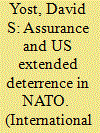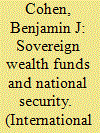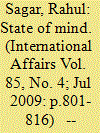|
|
|
Sort Order |
|
|
|
Items / Page
|
|
|
|
|
|
|
| Srl | Item |
| 1 |
ID:
091631


|
|
|
|
|
| Publication |
2009.
|
| Summary/Abstract |
Historically the NATO allies have focused considerable attention on US 'extended deterrence'- that is, the extension by Washington of an umbrella of protection, sometimes called a 'nuclear guarantee'. A persisting requirement has been to provide the allies with assurance about the reliability and credibility of this protection. This article examines the definition of 'assurance' used by the US Department of Defense for most of the past decade and argues that it has drawn attention to long-standing policy challenges associated with US extended deterrence in NATO. The article considers the assurance roles of US nuclear forces in Europe, as well as elements of assurance in Washington's relations with its allies regarding extended nuclear deterrence. Whether the allies will retain the current requirements of extended deterrence and assurance in their new Strategic Concept or devise a new approach will be an issue of capital importance in the policy review launched at the Strasbourg/Kehl Summit. Contrasting approaches to these questions are visible in the United States and Germany, among other allies. The main issues to be resolved include reconciling extended deterrence with arms control priorities; managing the divisions in public and expert opinion; and avoiding certain potential consequences of a rupture with established arrangements.
|
|
|
|
|
|
|
|
|
|
|
|
|
|
|
|
| 2 |
ID:
091627


|
|
|
|
|
| Publication |
2009.
|
| Summary/Abstract |
Political protest in Europe and the problematic politics surrounding bank recapitalization in the US have raised growing concerns about the rise of populist politics. Populist politics is problematic in its search for simplistic solutions to complex problems, its disdain for institutions and its political ambiguity. Nonetheless, the rise of populist mobilization also points to genuine concerns about the functioning of democracy. The politics of financial regulation has been dominated by a narrow, utilitarian and technocratic mode of policy-making that has tried to limit public debate, favouring an expert discourse which privileges questions of efficiency over questions of distribution. This article explores the distributional issues at stake in banking recapitalization (particularly questions about the returns governments receive for their investment) and regulation (through an exploration of the financialization literature). It argues that, while populist appeals to 'the people' are too ambiguous to be helpful, given the complexity of the interests at stake in financial regulation, there is a need for a wider and more democratic debate about financial regulation that pays greater attention to distributional issues. Populist mobilization can create pressure for debate, even if it presents few solutions. As a result, we should be wary of moves to shift too much regulation to the international level where populist mobilization is less effective.
|
|
|
|
|
|
|
|
|
|
|
|
|
|
|
|
| 3 |
ID:
091624


|
|
|
|
|
| Publication |
2009.
|
| Summary/Abstract |
Many insist that the world economy today is in the grip of the most severe financial crisis since 1931. Although the origins of this crisis are in dispute, the extent and scale of the changes prompted by it are becoming clear. Among these changes are a recalibration of the relationship between public and private authority, a reconfiguration of the regulatory responsibilities and capacities of the state with respect to the financial system, and a rebalancing of relations of power among states. While the financial crisis has generated points of stress along all of these axes of change, we should be wary of expecting an entirely new global financial order to emerge from the carnage. The complex links between financial order and world politics suggest that this financial crisis will result in an evolutionary rather than a revolutionary transformation in the world's financial order.
|
|
|
|
|
|
|
|
|
|
|
|
|
|
|
|
| 4 |
ID:
091638


|
|
|
|
|
| Publication |
2009.
|
| Summary/Abstract |
Japan and China's ability to manage their bilateral relationship is crucial for the stability of the East Asian region. It also has a global impact on the security and economic development of other regions. For just as China's rise has inevitably involved an expansion of its global reach, so Japan's responses to the challenges posed by China have increasingly taken a global form, seeking to incorporate new partners and frameworks outside East Asia. Japan's preferred response to China's regional and global rise in the post-Cold War period has remained one of default engagement. Japan is intent on promoting China's external engagement with the East Asia region and its internal domestic reform, through upgrading extant bilateral and Japan-China-US trilateral frameworks for dialogue and cooperation, and by emphasizing the importance of economic power to influence China. Japan is deliberately seeking to proliferate regional frameworks for cooperation in East Asia in order to dilute, constrain and ultimately engage China's rising power. However, Japan's engagement strategy also contains the potential to tilt towards default containment. Japan's domestic political basis for engagement is becoming increasingly precarious as China's rise stimulates Japanese revisionism and nationalism. Japan also appears increasingly to be looking to contain China on a global scale by forging new strategic links in Russia and Central Asia, with a 'concert of democracies' involving India, Australia and the US, by competing for resources with China in Africa and the Middle East, and by attempting to articulate a values-based diplomacy to check the so-called 'Beijing consensus'. Nevertheless, Japan's perceived inability to channel China's rise either through regional engagement or through global containment carries a further risk of pushing Japan to resort to the strengthening of its military power in an attempt to guarantee its essential national interests. It is in this instance that Japan and China run the danger of a military collision.
|
|
|
|
|
|
|
|
|
|
|
|
|
|
|
|
| 5 |
ID:
091629


|
|
|
|
|
| Publication |
2009.
|
| Summary/Abstract |
Preparations for the next UK defence review are under way; a struggle is imminent and the lines of battle are being drawn. There is a grave danger that in the new 'age of austerity' defence planning-and strategy generally-will be driven by tribal conflicts, either between supporters of one or other of the armed services or between contending viewpoints about the nature of conflict. And there will be others who will argue that the defence review should be driven simply by the need to reduce government expenditure, as quickly as possible. These arguments not only reduce the defence debate to a struggle between various incompatible and uncompromising tribal beliefs-'war among the fetishes', perhaps-they also miss the point. This article gauges the extent of the economic challenges which the UK defence establishment will confront over the coming decade. The authors consider how best to approach the problem of undiminished (and even expanding) commitments at a time of decreasing resources. They argue that defence planning should be driven by the notion of value (the ratio of function to cost), which in turn requires both a clear national political vision and a defence establishment which is output- rather than input-oriented. Finally, the authors assert that defence must transform itself to be able to achieve the outputs required in the most efficient and responsive manner.
|
|
|
|
|
|
|
|
|
|
|
|
|
|
|
|
| 6 |
ID:
091633


|
|
|
|
|
| Publication |
2009.
|
| Summary/Abstract |
The American decision to deploy missile defence in Poland endangered the central myth of Putin's regime (Russia's rebirth as a Great Power), challenged the status of Putin as Russia's strongman, and introduced an additional uncertainty into the carefully scripted campaign for succession to Putin. It also hit the raw nerve of Russia's reliance on nuclear weapons. The character of Russian policy-making has guaranteed the worst-case scenario evaluation of the American programme. The Russian elite's world view has magnified the problems resulting from the deployment into fears of a window of vulnerability.
|
|
|
|
|
|
|
|
|
|
|
|
|
|
|
|
| 7 |
ID:
091628


|
|
|
|
|
| Publication |
2009.
|
| Summary/Abstract |
One of the most striking financial developments in recent years is the emergence of sovereign wealth funds (SWFs)-large publicly owned investment portfolios, which are growing rapidly in both number and size. In a global environment already roiled by a prolonged credit crisis, SWFs raise tricky and potentially controversial new questions for international financial regulation. One issue of concern to many in host countries is the possibility that some SWFs might be used for overt or tacit political purposes, posing a challenge for global monetary governance: a Great Tradeoff between the world community's collective interest in sustaining the openness of capital markets and the legitimate national security concerns of individual host countries. Can some balance between the two be found that will be both stable and acceptable to all concerned? Individually as well as collectively, recipient countries have begun to address the regulatory challenge directly. To date, however, accomplishments have been slight and have failed to stem a noticeable drift towards financial protectionism. A review of some recent proposals suggests that there is no foolproof solution to the Great Tradeoff. But the potential for controversy could be significantly reduced by a negotiated agreement among host governments addressing three key issues: definitions, risk assessment and dispute resolution. The most logical venue for such an exercise would be the OECD, building on its already extensive experience with international investment issues.
|
|
|
|
|
|
|
|
|
|
|
|
|
|
|
|
| 8 |
ID:
091634


|
|
|
|
|
| Publication |
2009.
|
| Summary/Abstract |
As its economic power, military strength and cultural influence expands, India draws ever closer to becoming a leading player in world politics. Yet relatively little is known about what Indians take to be the nature of international politics and, correspondingly, how their power and influence should be used. A survey of Indian political thought reveals sharp disagreements. Moralists wish for India to serve as an exemplar of principled action. Hindu nationalists want Indians to act as muscular defenders of Hindu civilization; strategists advocate cultivating state power by developing strategic capabilities; and liberals seek prosperity and peace by increasing trade and interdependence. This article argues that current trends indicate that India will increasingly prioritize its quest for prosperity and peace. But if this quest is thwarted by external threats, then calls to enhance India's military power will most probably grow louder, and be heeded more closely.
|
|
|
|
|
|
|
|
|
|
|
|
|
|
|
|
| 9 |
ID:
091637


|
|
|
|
|
| Publication |
2009.
|
| Summary/Abstract |
The literature on China's regional rise reveals divergent understandings of why China changed its regional strategy and when such a transformation occurred. There are also different understandings of the extent of China's power in the region-or more often, the extent to which US power in East Asia is already challenged by China's regional rise. Nevertheless, there is a consensus of sorts over how Chinese policy has changed with an emphasis on a combination of proactive diplomatic initiatives and ever increasing economic interactions. After providing a brief overview of the existing literature, the main part of this article considers the role of China's 'soft power' in reconfiguring power relationships in East Asia. It suggests that while the US might have lost some of its ideational appeal, it is through working within existing frameworks and 'norms' (rather than establishing new revisionist alternatives) that China has had most success in assuaging fears of the consequences of its rise. However, the way in which others conceive of China's rise and Chinese power (and subsequently act) does provide a form of 'non-hard' power that might help China's leaders attain their regional objectives particularly in light of the continuing global economic crisis.
|
|
|
|
|
|
|
|
|
|
|
|
|
|
|
|
|
|
|
|
|